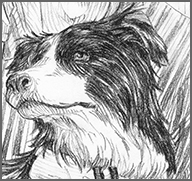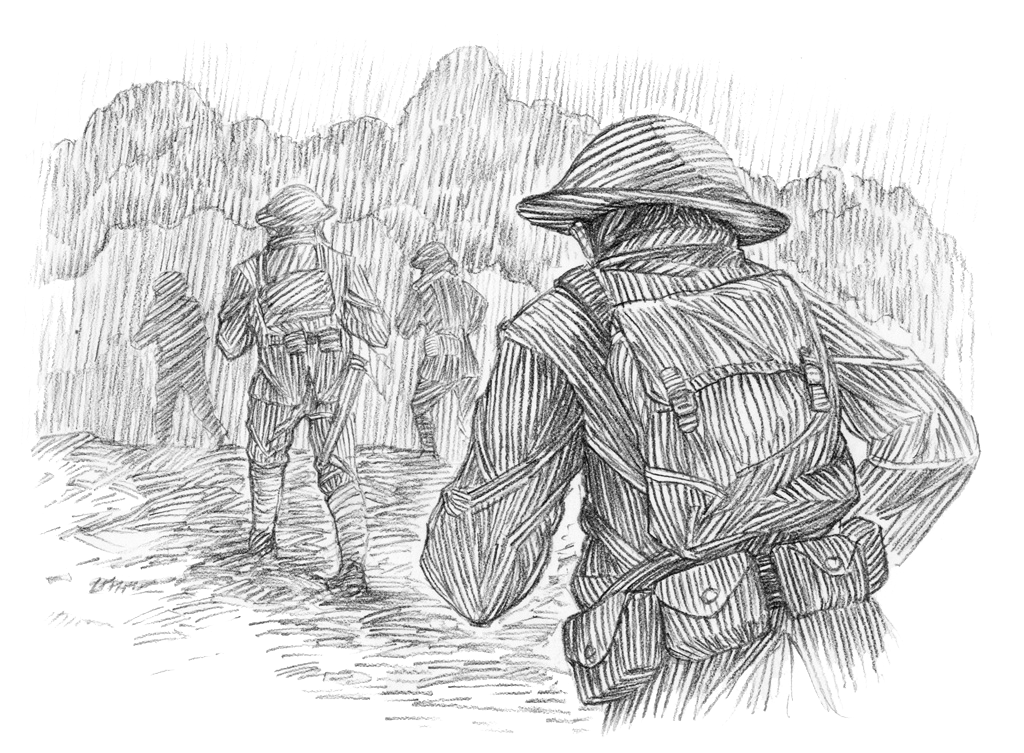
CHAPTER 12
Find the Wounded
June 6, 1917
Once again the dog squad was assigned to the medical corps of the 3rd Battalion Worcestershire. The soldiers of the regiment greeted Tweed and me and the other dogs with hearty hellos, kisses, and pats while our handlers looked the other way. Orders were strict: we were not to be pets of the infantry. But this was a special time. Zero hour was only a few hours away. I could feel the tension in the soldiers’ hugs. Not one of them knew if he would survive the massive assault.
The regiment assembled in trenches close to Nutmeg Avenue, where the soldiers had skirmished before. I thought of Private Bingham and the many other wounded soldiers I had found. Were they safe in hospitals? On a ship bound for home?
“Medical corps waits at the far ends of the front line,” said Corporal Currell, the officer in charge. “Because these trenches are newly dug and there was no time for dugouts, you’ll have to fashion your own shelter. You’ll be safe there until needed.”
Tweed and I were assigned the south end. With our handlers, we trudged down lines crowded with soldiers writing last words and fixing stew over little round stoves.
“The generals issued new Tommy cookers,” one of the orderlies said with a roll of his eyes. “Hoping a bit of tea would make us forget they were sending us to the front line to die.”
The stew smelled delicious and I licked my lips. Often Sergeant Hanson would bring me a tin, knowing it was my favorite. Finally we reached our post at the far end of the line. It was sparsely guarded by soldiers. A few nodded at us as our handlers found places to sit on ammunition cases under a ledge of rock.
“We’re less than a mile from Messine,” a young stretcher bearer said as he rolled bandages. He didn’t sound like Private Kent. “Or what’s left of it,” he added bitterly. “The entire village has been bombed and burned to the ground.”
“You’re a Belgium lad?” Private Kent asked.
The young man nodded. “Messines was my home. We farmed here.” He gestured beyond the trench. “It’s hard to imagine these fields were once lush with sugar beets and barley. All our livestock? Gone. All the families? Bombed out. All the homes? Rubble.” He shook his head sadly, then fell silent.
I lay down next to Tweed. Her head rested on her paws, but shivers racked her body. I slid closer, hoping to warm and reassure her.
Private Reeves checked his watch. “It’s 0200 hours. One hour to go.”

The tromp of boots signaled that more troops had arrived. Cookers and pencils were put away. Rifles and bayonets were readied. Private Kent checked that our gas masks were handy, then stroked my head.
The soldiers began to sing softly. Their voices rang up and down the trench, distracting us from what lay ahead.
Bombed last night—bombed the night before.
Gonna get bombed tonight if we
Never get bombed anymore.
When we’re bombed, we’re
Scared as we can be.
Oh blast the bombin’ planes from Germany.
Gassed last night—gassed the night before…
Corporal Currell interrupted the singing and sent out a small scouting patrol. Silently, the six soldiers disappeared over the parapet. They hadn’t been gone long before gunfire rang out in two volleys. I bolted to my feet.
“The lads must’ve been attacked,” Private Kent whispered. “The Germans are close.”
We watched and waited until finally five of the soldiers rushed back into the trench. “There was a small platoon of Huns holed up in a bunker. Private Jameson was hit,” one told the corporal. “We couldn’t find him in the dark. If he stays out there, the Germans will kill him or he’ll be blasted to bits at zero hour.”
Corporal Currell checked his watch. “We have half an hour to bring him back. Send a dog.”
He looked at Tweed, but I leaped up in front of him, ears pricked.
Private Kent stood. “Darling will find ’im.” He unhooked my leash. Holding me under his arm, he climbed the ladder and set me on the parapet. “Be quick, girl. Begone.”
Nose to the ground, I tore off. Back and forth I trotted, all my senses at attention as I searched for the fallen soldier. The sky was still dark, but my eyes gradually adjusted. The constant barrage of gunfire from the British lines was deafening. I would have to rely on sight and smell.
How far could our soldiers have gone? The shots had seemed so close.
The barbed wire had been cut in anticipation of the coming assault, so I quickly passed through. The earth beyond seemed even more shattered. There was no sign of life. No green grass, no birds, and no wounded soldier.
I was taking too long.
Then my nose found a trail of blood. Swiftly I followed it to a shell hole. The soldier was alert. When he saw me, his eyes opened wide. He was holding both palms against the bloody spot on his thigh where he had been shot.
“Good dog!” he praised. I sat beside him as he rustled in my saddlebags for bandages and antiseptic. “If I can just wrap this leg to stop the bleeding, I can follow you back…”
I turned to go fetch the orderlies as I had been trained to do, but the soldier grabbed my collar. I could tell he didn’t want me to leave. I didn’t blame him. No one wanted to be alone in no man’s land.
Looking at my tag, the soldier whispered, “Hello, 204. I’m Private Mike Jameson—”
His introduction was cut short by an unexpected silence. The rat-a-tat-tat of guns and booms of artillery had been constant the past few days. This sudden, deathly quiet was eerie.
Then I heard a faint sound: the trilling of nightingales as they sang before dawn.
My body quivered from nose to tail. Private Jameson held his breath. He hugged me to his chest as if for reassurance. “Heaven help us,” he whispered.